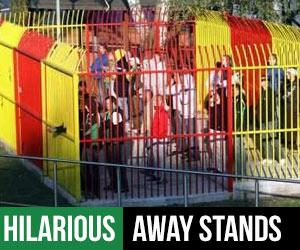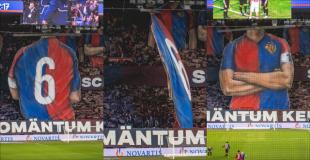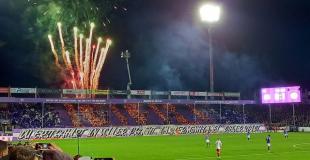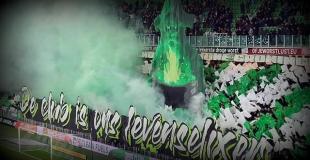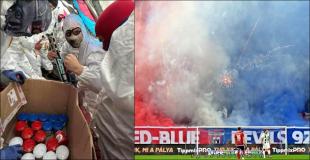Want to buy pyrotechnics? Visit pyro.ultras-tifo.net
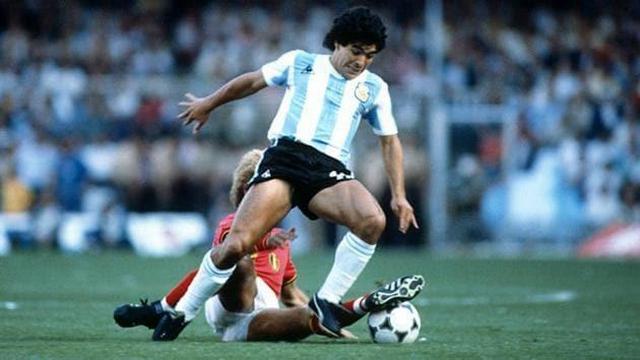
Although football is occasionally suited to Pele's renowned quote, "the beautiful game", it is not always so captivating and pleasant to observe.
Numerous football contests deviate from this proverb. Certain encounters are so abhorrent, violent, and filthy that they attain historical notoriety due to their abhorrence.
Although some degree of physicality is sometimes encouraged and even expected in football, it is possible to go too far. An intense bloodlust, a desire for vengeance, an improperly timed challenge, or an incompetent referee can collectively contribute to a match that epitomises nothing but barbarism and savagery.
Greetings and welcome to Ultras-Tifo. Today, we will be presenting our selection of the five most intense, brutal, violent, and savage football matches in the sport's history.
Barcelona vs. Athletic Bilbao (1984)
Maradona Madness
Andoni Goikoetxea of Athletic Bilbao viciously tackled Barcelona legend Diego Maradona in 1983, breaking the Spanish player's tibia and garnering him the moniker "the Butcher of Bilbao." In 1984, months before Barcelona's Copa del Rey final against Athletic Bilbao at the Santiago Bernabéu, Maradona returned with a vengeance in his heart.
The September incident at the San Mamés had significantly strained relations between the two organisations. The situation was further exacerbated by the match taking place at Real Madrid, an establishment that both factions of supporters despised, particularly during the Franco era. The Catalans and Basques criticised the national anthem prior to kickoff, demonstrating their contempt for the Spanish state. The atmosphere was aided by the vigorous waving of regional flags concealed by the metal fencing encircling the pitch, adding to the mutual animosity.
The initial phases comprised a series of physical altercations, with Athletic defender Iñigo Liceranzu notably assessing the recovery of Maradona's ankle following the intervention of his teammate nine months prior. Bernd Schuster, a midfielder for Barcelona, also underwent a bone structure examination, which allowed his ire to fester throughout the match.
After Bilboa's one-nil victory, Maradona was verbally assaulted by Miguel Sola, sparking anarchy. The Argentine downed Sola with a knee to the face after dragging him to the ground. His Barça colleagues were prompted to join him as Maradona began kicking everyone. Even supporters participated by tossing objects at the players, which prompted riot officers to enter the pitch to restore order. This effectively concluded Maradona's tenure with Barcelona, as he joined Napoli shortly thereafter.
Portugal vs. Holland (2006)
World Cup Chaos
The round-of-16 match between Portugal and the Netherlands is arguably one of the worst World Cup spectacles of the last three decades. Despite not being particularly violent, it remains one of the most undesirable matches in the competition's history. In contrast, this quarterfinal match was a dreary contest marked by excessive infractions, little actual football, and a referee eager to throw cards.
This occurred against the backdrop of FIFA's pre-tournament effort to eradicate unscrupulous and violent misconduct, which essentially instructed officials to yellow-card virtually anything. The evident deficiency in this approach should have been detected at the outset: if every action results in a booking, then the total number of bookings increases, excellent tackles are unintentionally penalised, and progress towards resolving the issue remains elusive.
In the harsh light of day, this approach was exposed in this match, as referee Valentin Ivanov dished out a record sixteen yellow cards and four red cards. Mark van Bommel, unsurprisingly, initiated the proceedings by receiving a yellow card for a sly charge in the opening two minutes.
With sixteen, the match tied the World Cup record for yellow cards given, and with four, it established a new benchmark for red cards. Costinha and Deco of Portugal, Giovanni van Bronckhorst, and Khalid Boulahrouz of the Netherlands were among those who were dismissed. Despite Maniche's contribution to Portugal's victory, the match will be more renowned for its chaotic nature.
Valencia vs. Inter Milan (2007)
Champions League Brawl
The goalless draw in the second leg of the round of 16 in the Champions League between Valencia and Inter Milan seemed unexciting. However, the situation shifted towards the end of the match, resulting in the Spanish team advancing due to the away goals rule.
Oddsmakers placed Valencia as the betting favourite at the time, but a tight clash was expected, with both sides receiving plus-money odds. Compared to this 2007 UCL meeting, modern sports wagering has significantly evolved with the latest betting site launches. Still, no generation of bookmaking could’ve predicted the altercations that were about to ensue.
Amidst the altercation, David Navarro of Valencia delivered a forceful blow to Nicolás Burdisso of Inter, resulting in a fracture of his nasal bone. Navarro subsequently fled while Burdisso and his inter-colleagues attempted to strike him. This ignited an additional altercation that persisted in the changing rooms.
UEFA imposed severe penalties on all individuals accountable. Following the appeals, Valencia's Navarro received a six-month ban, while Carlos Marchena was suspended for two games. Maicon played in three matches for Inter, Iván Córdoba played in two, and Burdisso was suspended for six.
Italy vs. Chile (1962)
Santiago Mayhem
Although the Netherlands versus Portugal match is widely regarded as the harshest World Cup match, the most violent of all occurred in 1962 when Italy defeated Chile.
The host nation was met with unfavourable remarks from the Italian press before their group stage match, which escalated the animosity before the start of play. During the 90 minutes, filthy tackles, flying kicks, and fists were launched continuously, rendering the match more akin to an MMA fight than a traditional football match.
Unbelievably, the match concluded in Chile's favour with a 1-0 victory; nevertheless, its consequences would have an immense impact on the sport. That day, referee Ken Aston was in charge of officiating. He had been appointed Head of Refereeing for the 1966 World Cup in England. In the wake of yet another tournament filled with vexatious challenges, he devised a remedy.
One day, while driving his vehicle, he came across some traffic lights and was instantly struck with the notion of creating red and yellow cards—a concept that would eternally alter the game. The first tournament to utilise cards was the 1970 FIFA World Cup, which provided referees with an additional method to establish their authority in the sport.
Celtic vs. Racing Club (1967)
Montevideo Madness
The Intercontinental Cup, which is no longer in existence, was an annual two-legged match between the champions of the European Cup and Copa Libertadores. In 1967, Glasgow Celtic encountered Racing Club from Argentina in what is considered the most notorious game of the competition.
The Hoops emerged victorious in the initial match at their home ground with a 1-0 scoreline, characterised by excessive fouling and unsportsmanlike behaviour. However, the subsequent game, which ended with a 2-1 score in favour of Racing, was also marred by similar misconduct. Due to the tie-in wins, a playoff was necessary to determine the victor, with Montevideo, the capital of Uruguay, selected as the neutral location.
The game was a complete catastrophe both in terms of gameplay and entertainment since Racing deliberately resorted to foul play throughout the encounter. Paraguayan referee Rodolfo Perez Osorio completely failed to maintain control over the match, while Celtic reacted to their opponent's provocations by losing their composure and retaliating.
It is an unfavourable indication when riot police must interfere on the pitch, resulting in the expulsion of four Celtic players and two Racing players. The Argentine team emerged victorious with a final score of 1-0.







